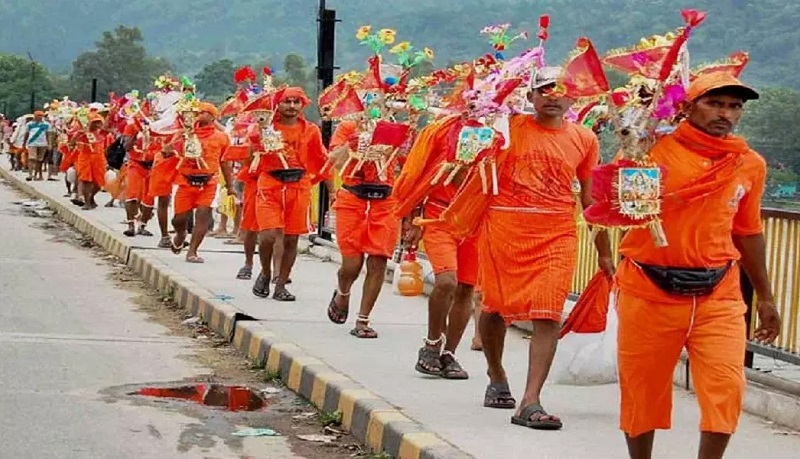Kanwar Yatra: A Divine Pilgrimage of Devotion and Unity to Lord Shiva
Table of Contents

Kanwad rituals are an essential part of the annual Kanwar Yatra, a sacred pilgrimage observed by Lord Shiva devotees in India. During the Kanwar Yatra, millions of devotees, known as Kanwads, embark on a journey to holy places, particularly to collect water from the sacred rivers like the Ganges, Yamuna, and others. They carry the holy water back to their hometowns and offer it to the Shiva temples.
Rituals of Kanwad in Shravan Month of Sawan
The Kanwad rituals usually take place during the Hindu month of Shravan (Sawan), which falls between July and August. Here are some key rituals observed during the Kanwar Yatra:
- Kanwar Decoration:
Devotees dress in saffron-colored attire and adorn themselves with kanwads, which are ornate bamboo or metal structures used to carry the holy water. They often wear rudraksha beads and offer flowers to Lord Shiva. - Fasting:
Many Kanwads observe strict fasting during their pilgrimage. They abstain from consuming non-vegetarian food and often follow a simple diet of fruits, milk, and vegetarian meals. - Walking Barefoot:
Devotees undertake the Kanwar Yatra on foot and walk for long distances to reach the sacred rivers. Some Kanwads even walk hundreds of kilometers, showing their dedication and devotion to Lord Shiva. - Collecting Holy Water:
Upon reaching the holy rivers, the Kanwads collect water in their kanwads and fill it with devotion and reverence. This water is considered highly auspicious and is believed to have purifying properties. - Kanwar Chants:
While on their pilgrimage, Kanwads chant hymns, bhajans, and prayers dedicated to Lord Shiva. The sounds of “Har Har Mahadev” and other Shiva mantras echo through the journey. - Offering Water to Shiva Temples:
After returning to their hometowns, the Kanwads offer the holy water they collected to local Shiva temples. This ritual is known as “Jalabhishek,” where they pour the sacred water on the Shivalinga as an act of devotion and respect. - Communal Spirit:
The Kanwar Yatra fosters a sense of unity and brotherhood among the devotees. People from various backgrounds come together to participate in the pilgrimage, strengthening their bond as followers of Lord Shiva.
What is “Daak Kanwad”
“Daak Kanwad” is a specific type of pilgrimage or yatra undertaken by devotees of Lord Shiva during the month of Shravan (Sawan) in the Hindu calendar. In this traditional practice, the devotees carry the holy water from the sacred rivers, especially the Ganges, on foot and walk to their hometowns or local Shiva temples to perform religious rituals and offer the water to Lord Shiva.
Also Read: Importance of Shiva worship in Sawan month
The term “Daak” is derived from the Hindi word “डाक” which means “postal” or “mail.” In the context of the Kanwar Yatra, “Daak Kanwad” refers to the process of transporting the sacred water from the pilgrimage site back to the devotee’s home or local temple. Instead of physically walking the entire distance to the sacred river and back, some devotees opt for the “Daak Kanwad” method, where they collect the holy water from the river and then use various transportation means such as buses, trucks, or other vehicles to bring the water back to their place of worship.
How “Daak Kanwad” is different from Traditional Kanwad?
While the traditional Kanwar Yatra involves devotees walking the entire distance, “Daak Kanwad” allows those with physical limitations or those unable to undertake the long journey on foot to participate in the sacred practice. The sentiment and purpose of the yatra remain the same – to express devotion to Lord Shiva, seek blessings, and offer the sacred water to the deity.
Both the traditional Kanwar Yatra and “Daak Kanwad” hold immense spiritual significance for devotees and are considered acts of penance, faith, and dedication to Lord Shiva during the auspicious month of Shravan.
The Kanwar Yatra and its associated rituals hold immense spiritual significance for devotees, who believe that undertaking this sacred journey will bring them blessings, protection, and spiritual growth.



